
“We want the world to know that Vancouver and BC have world-class poverty and homelessness.”
On February 3, 2008, the first annual Poverty Olympics were held at the Carnegie Library in Vancouver’s Downtown Eastside. Just in time for the two-year countdown to the 2010 Winter Games, the event was held to inform international media of the current poverty and homelessness situation in Vancouver. Despite being described as a “massive crisis” by UN observer Miloon Kothari in 2007, the city and province have done very little to rectify the numerous humanitarian issues that have become more pressing with the arrival of the global mega-event. Already, several residential hotels have been bought out by developing companies and rising rental costs have displaced hundreds.
David Eby of the Pivot Legal Society remarks that, “the countdown to the Games is quickly turning into a countdown to international embarrassment.”
The Poverty Olympics was organized by a coalition of community groups and organisations, such as VANDU, the Carnegie Community Action Project, Raise the Rates, Streams of Justice, and the BC Persons with AIDS Society, which combined their efforts to put on the event.
Instead of launching off ski slopes, the Poverty Olympics featured Welfare Hurdles, the Poverty-Line High Jump, and Long Jumps over Bedbug-Infested Mattresses.
Throughout the day, the spirit of the Eastside community truly shined. Trish Garner from Raise the Rates notes, “I’ve just never seen a community like it…They really care for each other. And I think that’s what happens when they’re struggling; they have to band together.”
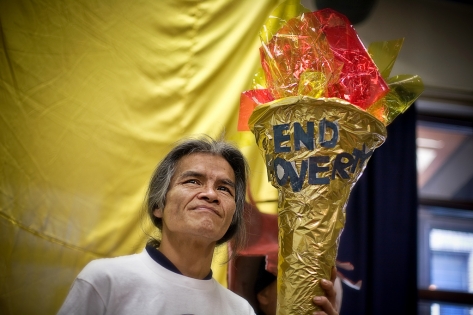
The Poverty Olympics torch is held high as a symbol to end poverty in Vancouver’s Downtown Eastside.

The audience gives a moment of silence before the start of the Poverty Olympics. In 2002, the provincial government cut welfare rates and introduced barriers that kept people in need from getting help. Homelessness has more than doubled since then, and B.C. has more people living below the poverty line than any other province in Canada.

Jean Swanson of the Carnegie Community Action Project (CCAP) addresses the large crowd regarding the issue of growing homelessness in the city. According to the City of Vancouver’s Judy Graves, there are at least 2,300 homeless people in Vancouver, which marks a 78 per cent increase from the last homelessness count in 2005.
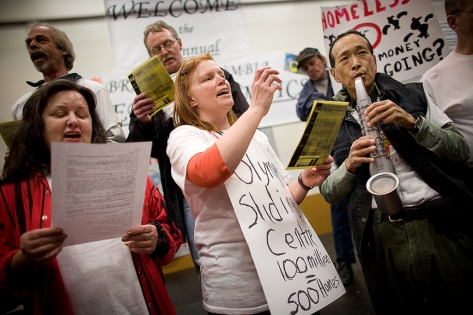
Wendy Pedersen and the Carnegie Community Action Project sing their rendition of ‘Oh Canada!’ which declares “that [B.C.’s] 40 million [dollar] surplus could end poverty now!” Instead, surplus spending has been re-directed from social housing promises. “We want the world to know that Vancouver and B.C. have world-class poverty and homelessness.”
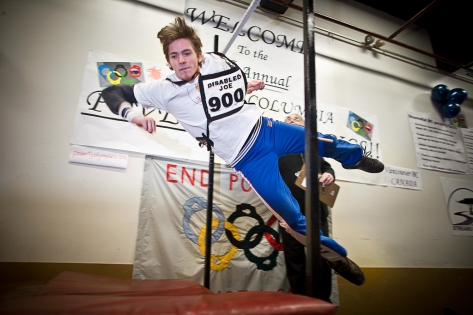
Despite all his efforts, Disabled Joe doesn’t quite make it over the poverty line.
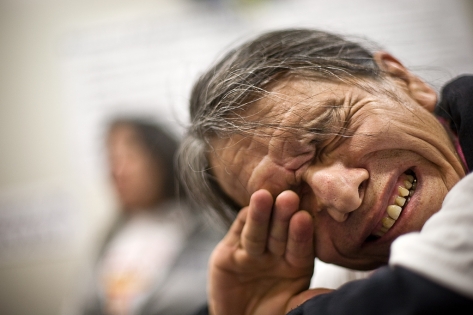
Many suffer financially, such as Steven, who has a hard time getting through the welfare hurdles. Barriers to getting welfare include the two-year independence test, the three-week work search, employment plans, web orientation, lack of transportation and inordinate documentation demands.
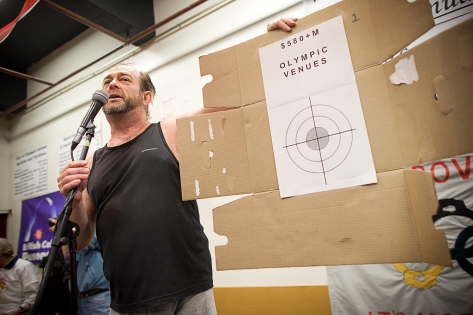
Not only are marginalized populations in Vancouver not benefiting from the Games, they are being displaced by new policies targeted at “cleaning up” Vancouver in time for 2010.
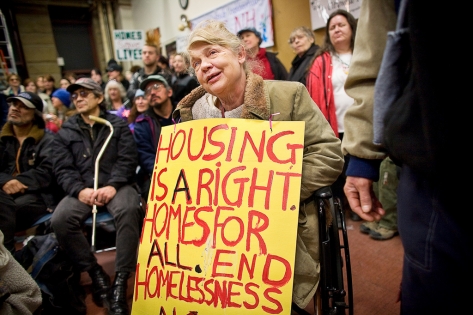
Vancouver is losing affordable housing at an alarming rate, which consequently means a further increase in homelessness. In recent months, five low-cost rental buildings in and around the Downtown Eastside closed or issued eviction notices, representing at least 180 units.

The construction of the Olympic Village in Downtown Vancouver could provide valuable social housing units after the completion of the 2010 Vancouver games. So far, however, efforts by local coalitions to promote this plan have proved unsuccessful.









